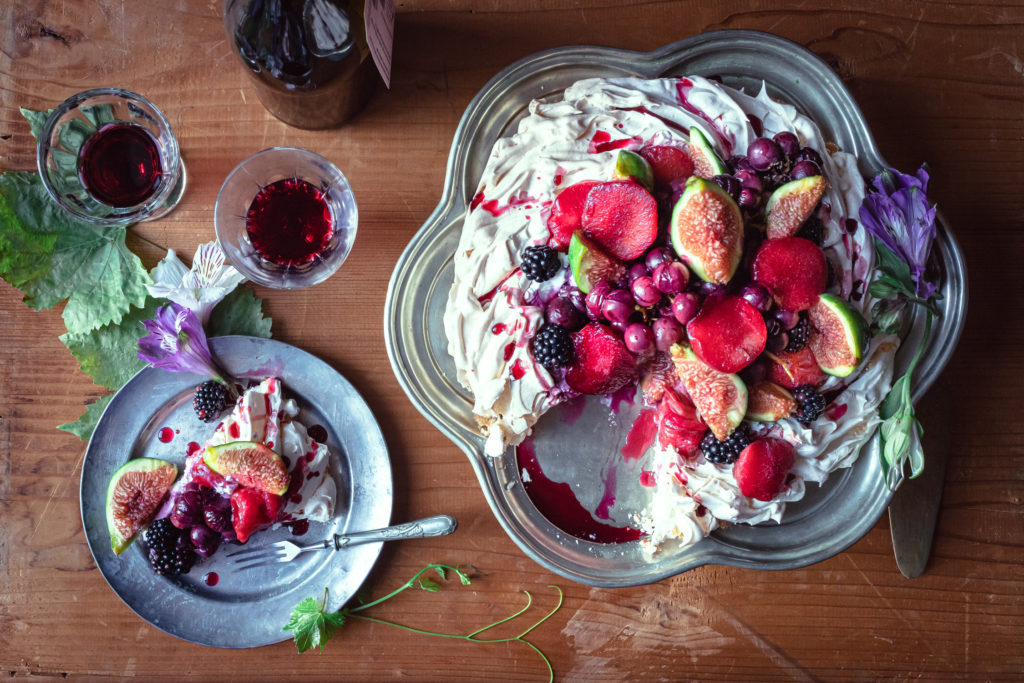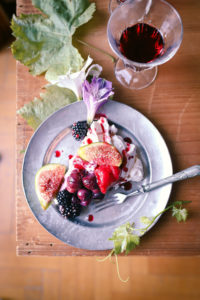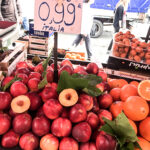 Pavlova is one of the easiest desserts you can make at home, which effortlessly delivers a dramatically gorgeous result. It’s the perfect summer dessert with a glass of Christian Busin Brut Rosé Champagne.
Pavlova is one of the easiest desserts you can make at home, which effortlessly delivers a dramatically gorgeous result. It’s the perfect summer dessert with a glass of Christian Busin Brut Rosé Champagne.
However, I’m not a huge fan of the classic pavlova; it’s too sweet for my palate. But for the pavlova to be pavlova, you must make meringue, and for the meringue to turn out well, you must use the proper amount of sugar. What I do to cut through the sweetness is add as many tart ingredients on the topping as I can. I also do something rather unorthodox: I use plain Greek yogurt instead of whipped cream between the meringue and the fresh fruit. The acidity cuts through the sweetness of the meringue and the juices of the fruit flavor the yogurt.
For this recipe I’m using the fruit of late summer (hence the name): figs, plums, blackberries and concord grapes. The grapes are roasted, and it’s important that you use concord grapes, because they’re the only variety that keeps their sweetness after roasting. If you don’t have access to concord grapes, just use more plums, or other berries, or any other fruit you like. But don’t roast other types of grapes, because they lose flavor.
I have used black plums, which I poach in a wine syrup with spices (a nudge towards the upcoming cold season).
Ingredients
 For the pavlova
For the pavlova
4 egg whites
250g caster sugar
1 tbsp vinegar or lemon juice
1 tbsp corn starch
10 – 12 cardamom pods or ½ tsp cardamom powder
For the poached plums
5-6 firm black (or red) plums, halved, pits removed
2 cups/ 450 ml fruity red wine
5 tbsp caster sugar
1 cinnamon stick
A few cardamom pods
A few cloves
For the topping
500g/about a pound greek yogurt (full fat)
4-5 large figs, some halved, some guartered
5 small bunches of concord grapes, rinsed
A handful of blackberries
2 tbsp of olive oil
Directions
Start with the wine syrup. Mix the 5 tablespoons of sugar with the wine in a medium pot, throw in the cinnamon stick, cardamom pods (lightly crushed) and the cloves and bring to a gentle simmer. When the syrup is ever slightly reduced, add the halved plums, and gently cook until soft (but the plums shouldn’t completely fall apart). The time depends on the firmness of the plums. Then remove the fruit and let the syrup thicken a bit more. Filter the syrup and keep it in a small container.
In the meantime, roast the grapes. Preheat the oven to 180’C/350’F/Gas mark 4. Line a baking tray with a baking sheet, place the grape bunches on it and drizzle with olive oil. Bake for 20 – 30 minutes until the grapes are roasted.
Now for the meringue: Preheat the oven to 180’C/350’F/Gas Mark 4. Bash the cardamom pods to get the seeds out and use a pestle to get a powder-ish result (skip this step if you’re using cardamom powder).
Whisk the egg whites until firm and foamy, and only then start adding in the sugar one tablespoon at a time. Keep whisking until the meringue firms up and becomes glistening. Now add the vinegar, the cornstarch and the cardamom powder.
Line a baking pan with baking paper and dollop the meringue onto it, trying to keep it in a circular shape. It should be like a large, shallow bowl. Put the tray in the oven and immediately lower the temperature to 140’C/275’F/Gas mark 1. Bake for 30 – 45 minutes. Then turn off the oven and let the meringue cool down slowly, first in the shut oven and then with the oven slightly ajar.
Assemble. When the meringue has completely cooled off, discard the excess water of the yogurt and mix it so that it’s creamy, then spoon it on the top of the meringue. Now arrange the roasted grapes, the poached plums, the pieces of figs and blackberries neatly on top and drizzle the wine syrup on top. Serve immediately.




